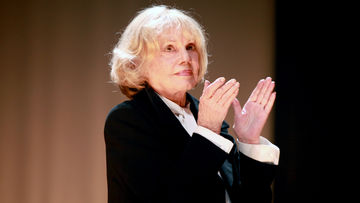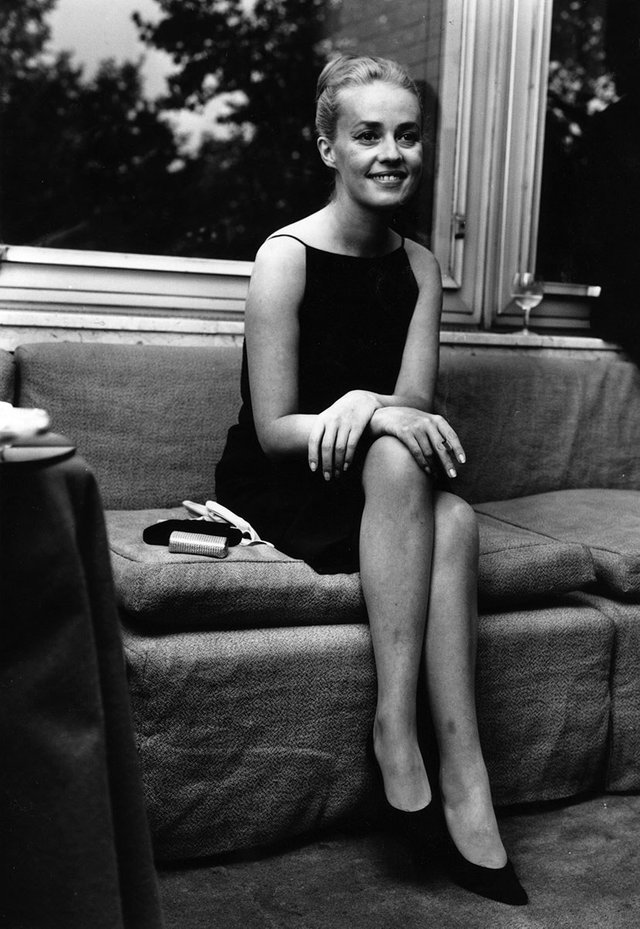Jeanne Moreau, Femme Fatale of French New Wave, Is Dead at 89

Jeanne Moreau, the erotic, rock voiced performing artist who turned into the substance of the New Wave, France's skeptical mid-twentieth century film development, most prominently in François Truffaut's 1962 film "Jules and Jim," kicked the bucket on Monday at home in Paris. She was 89.
Her passing was affirmed by the workplace of President Emmanuel Macron.
Ms. Moreau, whom columnists got a kick out of the chance to call the reasoning moviegoer's femme fatale, first became obvious in Louis Malle's 1958 show "The Lovers." The film incorporated a protracted love scene in which Ms. Moreau, playing an exhausted housewife taking part in an extramarital entanglements, ordered a plainly orgasmic minute, considered shameful at the time. It was four years after the fact, in "Jules and Jim," that she turned into an undeniable universal star, playing Catherine, the whimsical, damaging object of Oskar Werner and Henri Serre's yearning in a destined ménage à trois.
A fruitful stage performer in Paris, Ms. Moreau had a pouty, downturned mouth and circles under her eyes, and she was not for the most part viewed as photogenic. Making a score of for the most part forgettable movies from 1949 to 1957, she got the standard starlet treatment by cosmetics specialists. It was Malle who, throwing her in his initially highlight film, "Lift to the Gallows," shot her in common light without overwhelming cosmetics, giving her hauntingly expressive face a chance to work its enchantment.
Ms. Moreau went ahead to especially essential parts as Marcello Mastroianni's forlorn spouse in Michelangelo Antonioni's exemplary "The Night" (1961), a controlling worker in Luis Buñuel's "Journal of a Chambermaid" (1964), a wanton enticer in "Eva" (1962) and a wrathful recently marry recently widowed in "The Bride Wore Black" (1968).
Her honors wanted lesser-known movies. In 1960, she shared the Cannes Film Festival's best performer prize for her part as a murder witness in Peter Brook's mental show "Moderato Cantabile." She got the 1967 Bafta Film Award for best remote on-screen character, for her part as Brigitte Bardot's striptease accomplice in "Viva Maria!" And she at long last won a best on-screen character César, France's likeness the Oscar, in 1992, for playing a con lady in the parody "The Old Lady Who Walked in the Sea."
Keep perusing the primary story
Ms. Moreau invested little energy in Hollywood. She featured in John Frankenheimer's war dramatization "The Train" (1964) inverse Burt Lancaster, played a maturing European star in "The Last Tycoon" (1976) and did a cameo as an elderly relative of Cinderella in "Ever After" (1998). In spite of the fact that she was coordinated by Orson Welles no less than four times, the movies were European preparations.
She kept on performing into her 80s, incorporating into a French TV arrangement in 2013 and "Le Talent de Mes Amis" in 2015. She acted in front of an audience, winning the Molière grant in France for her execution in "Le Récit de la Servante Zerline," in 1988, and had a singing vocation, discharging a few collections. She coordinated three movies, including a 1983 narrative about the quiet screen star Lillian Gish.
Ms. Moreau got a Legion of Honor and was the principal lady accepted into the Académie des Beaux-Arts.

Photograph
Picture takers encompassing Ms. Moreau in 1962, amid her very promoted sentiment with the fashioner Pierre Cardin. Credit Reg Lancaster/Express, by means of Getty Images
Jeanne Moreau was conceived in Paris on Jan. 23, 1928, the girl of the proprietor of a Montmartre lodging and eatery and his British-conceived spouse, an artist at the Folies Bergère. Whenever Ms. Moreau was 15, she saw her initially play, "Antigone," and chose to wind up noticeably a performing artist. When she revealed to her dad about her desire, he slapped her.
His restriction was favorable position, in her eyes. "It compels you toward brilliance," she told a correspondent for the French daily paper Le Figaro in 2001. "All my life I needed to demonstrate to my dad that I was correct."
She learned at the Conservatoire National d'Art Dramatique and, at 20, turned into the most youthful ever full-time individual from the Comédie-Française, making her presentation in Turgenev's dramatization "A Month in the Country." She later joined the Théâtre National Populaire. In 1953, she separated herself in a creation of "L'Heure Éblouissante," when the other driving woman turned out to be sick and Ms. Moreau figured out how to play both the spouse and the fancy woman. Luckily, the two characters had no scenes together.